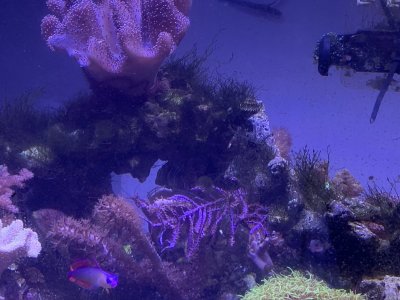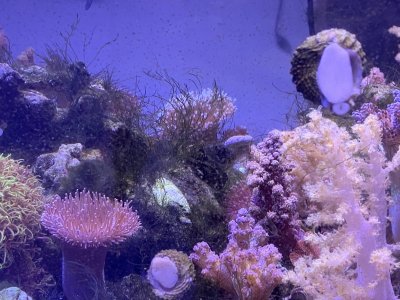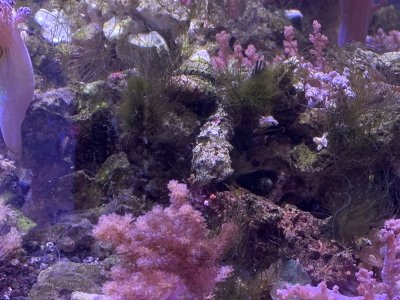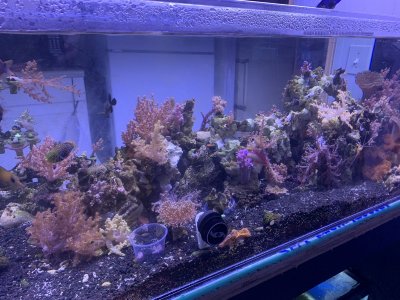- Joined
- Aug 18, 2019
- Messages
- 1,426
- Reaction score
- 1,728
I'm sure others have probably spoken up about this topic, but I wanted to share my experience, just in case someone hasn't or has a different view.
I know a lot of people use chemicals, bacteria, whatever to kill the more virulent algae but I've learned the hard way, due to the inhabitants of my tank, it's usually disastrous. If it works for you great, it never has for me.
My fix has been a sea hare.
On multiple occasions, I've used one to rid my tank of unwanted algae. But I've also had people tell me that they won't eat byprosis.
They're wrong.
Sea hares will and do eat just about any kind of algae they can get. I've even seen them eat cyno (yes I know it's technically a bacteria) but I don't recommend the cyno as it's not healthy for them and they eat too much it will kill them.
So how did I get mine to eat dreaded, indestructible byprosis.
First: You have to get the right species. The Dolabella sea hare is the only one who will work. They of course are the ugliest ones. But, they're ninjas so you'll rarely see them. They also need to be 3+ inches, 4 is better. Any smaller and they probably won't survive. They seem far more delicate at this size, need more tender algae and are intolerable to the slightest salinity or nitrate spikes. They are also more than likely to be sucked into wave makers. Larger ones are sticky enough to avoid this (usually).
Second: This, in my experience, is the trick to success. Pluck your algae. Yes, you read that correct. Sea hares under 6-7 inches, not stretched out, have a hard time eating super long byprosis. It's difficult for them to get it in their mouths. You trim that hair algae and they're like lawn mowers. Bigger ones (which I've not had success in locating recently) seem to do fine with longer algae.
Third: Nitrates. The Dolabella is more tolerant to nitrates than other more delicate sea hares. However, they have their limits. I run a tank with very high nitrates due to the kinds of corals I keep that rely on heavy feeding. It's routinely in the 30s even low 40's. They do not do well with nitrates over 50, and much higher and they will probably die. But again, they are much, much tougher than the prettier ones. Salinity is another thing to keep in check. And PH, they have 0 tolerance to low PHs. If you dip below 7.8 or so, they will probably die. Not immediately, so you have time to get it back up, but they won't last long. 8.0-8.2 is the best.
Pluses: Sea hare's are usually compatible with just about any tank. I have not tested this in a predator tank, so try at your own risk. Adding them at night will probably increase their survival. Most are more active at night as well. They move so slow, you often can't see them right in front of you. And I've gone weeks with no sign of mine then one night they are on the glass.
They are not destructive like urchins, crabs, etc. They will not eat your snails or small sleeping fish. They are very docile, and like I said, very, very slow to move.
There is an entertainment factor to sea hares. They fall in slow motion, so when they pop off your glass, it's rather humorous to watch them plummet to their "death" over 10 seconds or so. (and no they don't die of course)
They can right themselves from any position.
They can get into the tightest spaces. They are squishy and conform to their surroundings. Small rocky gaps stand no chance. If you can get your little finger in it, chances are, they can get their entire body into it.
They don't spit ink like other species (if they do I've never seen it) and are far less likely to harm your tank.
Down sides: This is not an overnight fix, a 4 inch sea hare may take up to two weeks to strip out this algae on your rocks etc. They are slow to get to some places and you may even have to manually move them to frag racks and stuff. They don't seek it out. They just accidentally run into it on their way across your tank.
They are mollusks not sea slugs. If you have mollusk predators in your tank (even worms) they may become lunch. Depends on how big that worm is I guess.
They are easily damaged if you take them out of the water. Their own body weight can crush them enough to kill them. So if you move them without water, do it fast. Better to move them in a jar.
They are slow to adjust. Drip acclimation is great, however it's normal for them to hide for 2-5 days once in a new tank before going to town on your algae.
They don't have a long life span. From what I've read the normal life span for one (wild or not) is anywhere from 6 months to three years. You have no idea how old it is when you get it. I think Dolabella may be on the longer end, I've had them for up to 2 years, 1 year seems the norm.
They hide when they're ready to die. If you're lucky you'll see them tucked away, and they'll usually be there 2-3 days before they croak. You know for sure they're going out when they won't eat anymore.
If you want to keep them around (and hair algae and others never really go away) you'll have to feed them. I use Nori, but they have voracious appetites and can easily plow through a sheet a day. Worth it IMO, but that's just me. Otherwise you may find yourself "renting" one every few months if your LFS can get them in at a reasonable size.
If you have tiny budding corals that get tangled in algae and they are not firmly attached to rocks, they may wind up consumed. I have not seen this happen with things like zoas or hard corals. But I have a nephtheidae tank and loose babies on the substrate have disappeared in a passing or when the sea hare goes through my nursery and some of them are not attached to the box.
I do not suggest buying these from Live Aquaria. Not because they aren't healthy, rather, they don't guarantee size, other than it will be a no smaller than 2 inches. I'm here to tell you a two inch sea hare probably won't survive. I've never had one survive, where as 3-4 inch ones have lived as long as 2 years.
They are messy when they die. They melt. Plain and simple. And they are absolutely smelly to remove. While I have not had my tank nuked by a dead Dolabella, even when shredded by a wave maker (lost many small ones this way), I don't suggest taking the chance, it dies, remove as quickly as you can.
Did I mention they were slow? I mean that. Don't give up on them. This last one I got has been the slowest eater ever and what normally takes a sea hare its size to clear out a 100 gallon tank (sump included) took this one a month. I still have some algae spots but need to pluck the algae down before he'll eat it. Now he's working on my frag tank which is just about spotless. My rocks are spotless in my main tank, so I'm proud of him for that.
Oh, and they are dumb. I mean so dumb I honestly don't know how they survive in the wild. If you have an uncovered heater, they may cook themselves on it. If they climb on it when it kicks on, or behind it, they will most likely stay there till they are well done. If your wave makers turn off for any length of time, they will probably climb in and you'll have sea hare confetti when it turns on. You move rocks, look out for them. They bury in the substrate and you could easily squish them because they will not move if the ground is disturbed.
Any how, that's all I've got. And of course this is all based on anecdotal evidence and has not been tested by any peer reviewed journal.
I know a lot of people use chemicals, bacteria, whatever to kill the more virulent algae but I've learned the hard way, due to the inhabitants of my tank, it's usually disastrous. If it works for you great, it never has for me.
My fix has been a sea hare.
On multiple occasions, I've used one to rid my tank of unwanted algae. But I've also had people tell me that they won't eat byprosis.
They're wrong.
Sea hares will and do eat just about any kind of algae they can get. I've even seen them eat cyno (yes I know it's technically a bacteria) but I don't recommend the cyno as it's not healthy for them and they eat too much it will kill them.
So how did I get mine to eat dreaded, indestructible byprosis.
First: You have to get the right species. The Dolabella sea hare is the only one who will work. They of course are the ugliest ones. But, they're ninjas so you'll rarely see them. They also need to be 3+ inches, 4 is better. Any smaller and they probably won't survive. They seem far more delicate at this size, need more tender algae and are intolerable to the slightest salinity or nitrate spikes. They are also more than likely to be sucked into wave makers. Larger ones are sticky enough to avoid this (usually).
Second: This, in my experience, is the trick to success. Pluck your algae. Yes, you read that correct. Sea hares under 6-7 inches, not stretched out, have a hard time eating super long byprosis. It's difficult for them to get it in their mouths. You trim that hair algae and they're like lawn mowers. Bigger ones (which I've not had success in locating recently) seem to do fine with longer algae.
Third: Nitrates. The Dolabella is more tolerant to nitrates than other more delicate sea hares. However, they have their limits. I run a tank with very high nitrates due to the kinds of corals I keep that rely on heavy feeding. It's routinely in the 30s even low 40's. They do not do well with nitrates over 50, and much higher and they will probably die. But again, they are much, much tougher than the prettier ones. Salinity is another thing to keep in check. And PH, they have 0 tolerance to low PHs. If you dip below 7.8 or so, they will probably die. Not immediately, so you have time to get it back up, but they won't last long. 8.0-8.2 is the best.
Pluses: Sea hare's are usually compatible with just about any tank. I have not tested this in a predator tank, so try at your own risk. Adding them at night will probably increase their survival. Most are more active at night as well. They move so slow, you often can't see them right in front of you. And I've gone weeks with no sign of mine then one night they are on the glass.
They are not destructive like urchins, crabs, etc. They will not eat your snails or small sleeping fish. They are very docile, and like I said, very, very slow to move.
There is an entertainment factor to sea hares. They fall in slow motion, so when they pop off your glass, it's rather humorous to watch them plummet to their "death" over 10 seconds or so. (and no they don't die of course)
They can right themselves from any position.
They can get into the tightest spaces. They are squishy and conform to their surroundings. Small rocky gaps stand no chance. If you can get your little finger in it, chances are, they can get their entire body into it.
They don't spit ink like other species (if they do I've never seen it) and are far less likely to harm your tank.
Down sides: This is not an overnight fix, a 4 inch sea hare may take up to two weeks to strip out this algae on your rocks etc. They are slow to get to some places and you may even have to manually move them to frag racks and stuff. They don't seek it out. They just accidentally run into it on their way across your tank.
They are mollusks not sea slugs. If you have mollusk predators in your tank (even worms) they may become lunch. Depends on how big that worm is I guess.
They are easily damaged if you take them out of the water. Their own body weight can crush them enough to kill them. So if you move them without water, do it fast. Better to move them in a jar.
They are slow to adjust. Drip acclimation is great, however it's normal for them to hide for 2-5 days once in a new tank before going to town on your algae.
They don't have a long life span. From what I've read the normal life span for one (wild or not) is anywhere from 6 months to three years. You have no idea how old it is when you get it. I think Dolabella may be on the longer end, I've had them for up to 2 years, 1 year seems the norm.
They hide when they're ready to die. If you're lucky you'll see them tucked away, and they'll usually be there 2-3 days before they croak. You know for sure they're going out when they won't eat anymore.
If you want to keep them around (and hair algae and others never really go away) you'll have to feed them. I use Nori, but they have voracious appetites and can easily plow through a sheet a day. Worth it IMO, but that's just me. Otherwise you may find yourself "renting" one every few months if your LFS can get them in at a reasonable size.
If you have tiny budding corals that get tangled in algae and they are not firmly attached to rocks, they may wind up consumed. I have not seen this happen with things like zoas or hard corals. But I have a nephtheidae tank and loose babies on the substrate have disappeared in a passing or when the sea hare goes through my nursery and some of them are not attached to the box.
I do not suggest buying these from Live Aquaria. Not because they aren't healthy, rather, they don't guarantee size, other than it will be a no smaller than 2 inches. I'm here to tell you a two inch sea hare probably won't survive. I've never had one survive, where as 3-4 inch ones have lived as long as 2 years.
They are messy when they die. They melt. Plain and simple. And they are absolutely smelly to remove. While I have not had my tank nuked by a dead Dolabella, even when shredded by a wave maker (lost many small ones this way), I don't suggest taking the chance, it dies, remove as quickly as you can.
Did I mention they were slow? I mean that. Don't give up on them. This last one I got has been the slowest eater ever and what normally takes a sea hare its size to clear out a 100 gallon tank (sump included) took this one a month. I still have some algae spots but need to pluck the algae down before he'll eat it. Now he's working on my frag tank which is just about spotless. My rocks are spotless in my main tank, so I'm proud of him for that.
Oh, and they are dumb. I mean so dumb I honestly don't know how they survive in the wild. If you have an uncovered heater, they may cook themselves on it. If they climb on it when it kicks on, or behind it, they will most likely stay there till they are well done. If your wave makers turn off for any length of time, they will probably climb in and you'll have sea hare confetti when it turns on. You move rocks, look out for them. They bury in the substrate and you could easily squish them because they will not move if the ground is disturbed.
Any how, that's all I've got. And of course this is all based on anecdotal evidence and has not been tested by any peer reviewed journal.



















